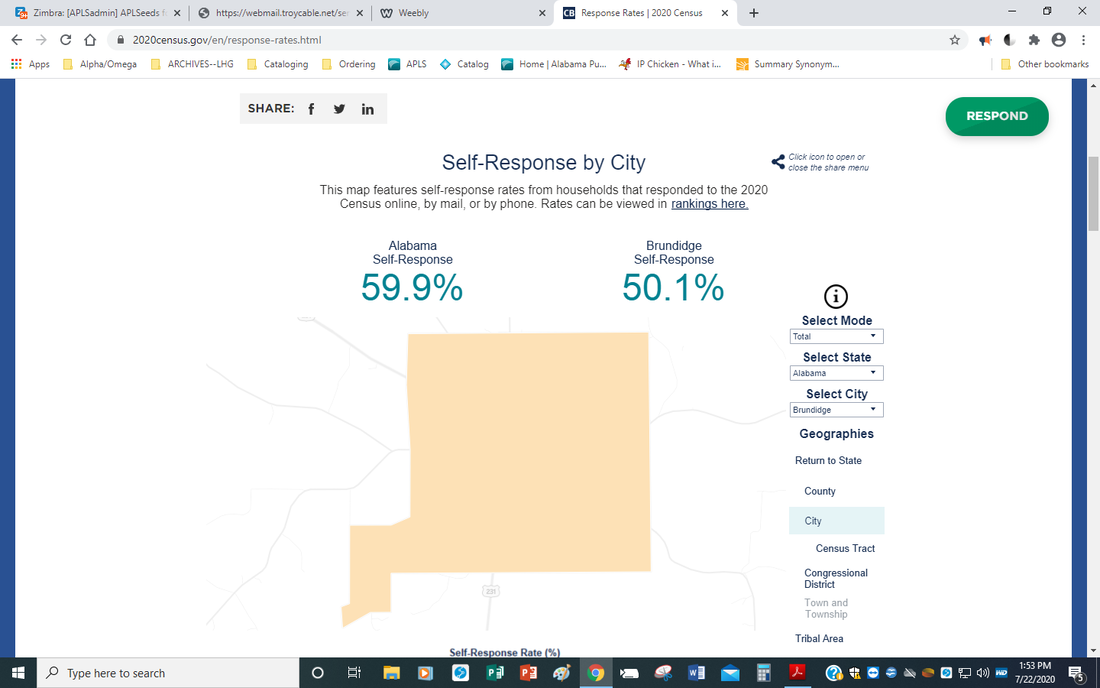2020 Census
The Deadline for Filling Out Your Census Form as been extended through October.
Sample Copy of the 2020 Census Questionnaire
Alabama and Brundidge will Lose Dollars--Fill Out Your Census Form
Why does the 2020 Census matter to Alabama?
Alabama has much at stake with the 2020 Census. Due to our state’s slowed population growth, we are in danger of losing at least one of our seven congressional seats, as well as federal funding that benefits our families, children, and communities. According to the George Washington Institute of Public Policy, Alabama currently receives $1,567 per capita through census-guided programs – this funding affects everyone. Fortunately, by participating in the 2020 Census we can protect our most valuable resources, including hospitals, police and fire departments, schools, roads and bridges. Programs, such as The Special Supplemental Nutrition Program for Women, Infants, and Children (WIC) and Children's Health Insurance Program (CHIP) could be affected.
The census is essential, which is why we must take matters into our own hands – together, we can control Alabama’s future. In 2010, 72 percent of Alabamians completed the census. This will not be enough in 2020, which is why we must ensure our 2020 Census count is complete, accurate, and fair. --
For more information:
Alabama Counts
AL Dept. of Economic and Community Affairs
Census 101: What You Need to Know
| census_101_pdf.pdf |
50 Ways Census Data Are Used
• Decision making at all levels of government.
• Drawing federal, state, and local legislative districts.
• Attracting new businesses to state and local areas.
• Distributing billions in federal funds and even more in state funds.
• Forecasting future transportation needs for all segments of the population.
• Planning for hospitals, nursing homes, clinics, and the location of other health services.
• Forecasting future housing needs for all segments of the population.
• Directing funds for services for people in poverty.
• Designing public safety strategies. • Development of rural areas.
• Analyzing local trends.
• Estimating the number of people displaced by natural disasters.
• Developing assistance programs for American Indians and Alaska Natives.
• Creating maps to speed emergency services to households in need of assistance.
• Delivering goods and services to local markets.
• Designing facilities for people with disabilities, the elderly, or children.
• Planning future government services.
• Planning investments and evaluating financial risk.
• Publishing economic and statistical reports about the United States and its people.
• Facilitating scientific research.
• Developing “intelligent” maps for government and business.
• Providing proof of age, relationship, or residence certificates provided by the Census Bureau.
• Distributing medical research.
• Reapportioning seats in the House of Representatives.
• Planning and researching for media as backup for news stories.
• Providing evidence in litigation involving land use, voting rights, and equal opportunity.
• Drawing school district boundaries.
•Planning budgets for government at all levels.
• Spotting trends in the economic well-being of the nation.
• Planning for public transportation services.
• Planning health and educational services for people with disabilities.
• Establishing fair market rents and enforcing fair lending practices.
• Directing services to children and adults with limited English language proficiency.
• Planning urban land use.
• Planning outreach strategies.
• Understanding labor supply.
• Assessing the potential for spread of communicable diseases.
• Analyzing military potential.
• Making business decisions.
• Understanding consumer needs.
• Planning for congregations.
• Locating factory sites and distribution centers.
• Distributing catalogs and developing direct mail pieces.
• Setting a standard for creating both public and private sector surveys.
• Evaluating programs in different geographic areas.
• Providing genealogical research.
• Planning for school projects.
• Developing adult education programs.
Need a temporary job?
If you are interested in a temporary position with the 2020 Census, you may apply online at: https://2020census.gov/jobs/job-details.html.
Map of Alabama--Low Response Areas
| census_map_low_response.pdf |
Thank you to the AL Public Library Service for the Census training for public libraries.
